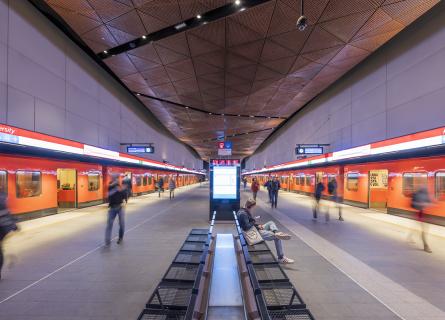
Cars equal freedom – the environment comes second
The mobility and transport sector is undergoing a major transformation
According to a survey of attitudes conducted by AFRY, a third of young adults in Sweden prefer to use their own car to get around.
While freedom and flexibility are valued highly among young people, the result is still surprising in light of an increasingly conscious generation, according to AFRY's mobility expert Karolina Pamp Sandgren.
The mobility and transport sector is undergoing a major transformation whereby both fuels and forms of ownership are being updated. Despite this, nearly three in ten young people (30 percent) aged 18-35 state in AFRY's survey that they prefer to travel around with their own car on a daily basis.

“This figure surprised us, as the theme of recent years has been that young people want to share - not own. This status has been reflected more in the cargo bike than in new car models. We see that 18 year olds are not raring to get a driving license to the same extent as before,” says Pamp Sandgren, mobility expert at AFRY.
A long-term change that began long before the pandemic is that many have already become accustomed to greater freedom and the opportunity to manage their own time. This also applies to mobility. Karolina believes that the figure represents the on-demand generation.
“Young people want to experience life in the here and now, they live their lives in real-time. These days young people stream entertainment when it suits their lives, they don’t adapt to the TV schedule. In the same way, they want to be able to get around when it suits them, not be subject to the bus timetable. The young generation translates that need into having their own car,” Karolina continues.
Mobility is a service, not a vehicle
Regional differences are relatively large, varying as much as 36 percent in northern Sweden, while in Stockholm only 24 percent prefer the car, partly reflecting the infrastructure that exists today.
In small and medium-sized cities, especially in northern Sweden where distances are longer, owning a car can be translated as "easy access to mobility. “The automotive industry is increasingly turning to selling time rather than products - as mobility is a service, not a vehicle,” Karolina continues.
Enabling sustainable transport of both goods and people, regardless of where you live, is a crucial issue in terms of our ability to meet climate goals. The results of the survey indicate that there is still a lot of work to be done to simplify and make these modes of transport accessible.
Young people opt for a car over the environment
The Young Mobility survey from NTF West shows a similar pattern as AFRY's survey. Their results indicate that young people prefer to use a car over bikes or public transport. 4 out of 10 aged 15-24 in western Sweden rarely/never use a bicycle and almost 7 out of 10 drive daily/several times a week. The conclusion of the survey is that environmental friendliness is seen as a bonus but not a decisive factor for young people when choosing a mode of transport.
"It is of course a disappointing result in terms of our ability to manage the transition to a more sustainable society. Young people like to raise their voices for the environment, but the measures should preferably not restrict their comfortable lifestyle. If we are to succeed, modes of transport other than cars must offer speed, accessibility and convenience,” Karolina concludes.


